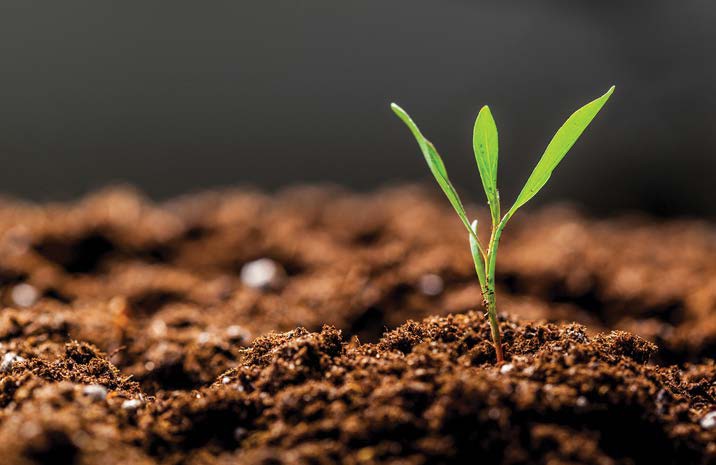
Top 10
grower resources
from Soil Wealth ICP
Phase 2
THE Soil Wealth ICP project has provided research and development extension services, products and communication on improved soil management and plant health since 2014.


BY DIMI KYRIAKOU AND CARL LARSEN RMCG

The Soil Wealth and Integrated Crop Protection (ICP) project works with growers to put soil management and plant health research into practice. As the team wraps up Phase 2, this article shares the most popular resources from the project over the past five years.
Improving soil management and plant health.
Soil Wealth ICP Phase 2 (VG16078) is a strategic levy investment under the Hort Innovation Vegetable Fund.
Since 2014, the Soil Wealth ICP project has provided research and development (R&D) extension services, products and communication on improved soil management and plant health to the Australian vegetable industry.
Applied Horticultural Research and RMCG have delivered the extension project on behalf of Hort Innovation and recently concluded Phase 2, which spanned from 2017 to 2022.
In this edition of WA Grower, the Soil Wealth ICP team looks back on the 10 most popular grower resources from Phase 2 of the project.
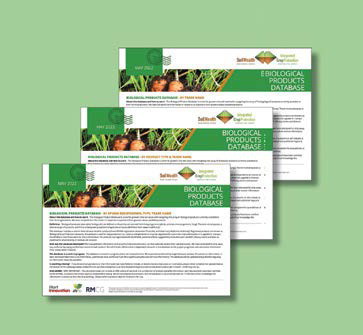
1 Biological Products Database
The most popular Soil Wealth ICP resource every year since it was published was the Biological Product Database. This is a tool to help growers navigate the array of biological products currently available to their farming business.
The database is regularly updated and available in three different formats for ease of use:
• Biological products sorted by trade name
• Biological products sorted by product type and trade name
• Biological products sorted by APVMA registration, type and trade name.
→ Access the database: soilwealth.com. au/resources/global-scan-and-reviews/ biological-products-database
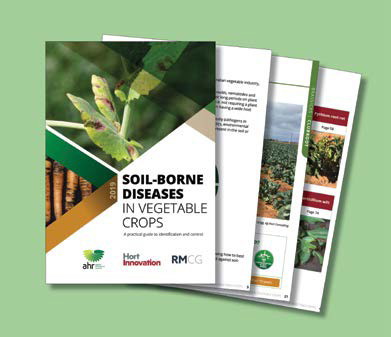
2 Soil-borne diseases in vegetable crops: A practical guide to identification and control
Soil-borne diseases present an ongoing challenge to the Australian vegetable industry, with an estimated $120 million in losses annually.
A practical field guide was developed to provide information on the identification and control of the major soil-borne diseases for a diverse range of vegetable crops. Each chapter covers:
• How to identify the most common soil-borne diseases affecting vegetable crops in Australia and conditions which favour disease
• Summary of the methods available for control
• Answers to common questions.
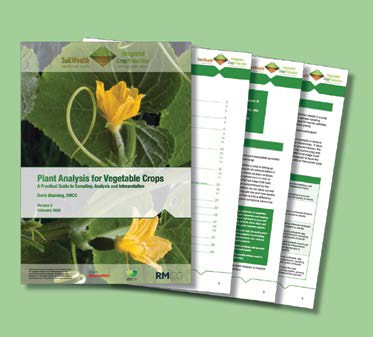
3 Plant analysis for vegetable crops: A practical guide to sampling, analysis and interpretation
Plant analysis allows growers to monitor a crop’s nutrient status and identify deficiencies early before yield and quality are reduced. This guide explains how plant analysis can be used to achieve balanced, site-specific nutrient management.
It covers types of plant analyses as well as sampling methods, desirable nutrient concentrations and interpreting results.
4 Soil Biology in Vegetable Production Masterclass
During Phase 2, the Soil Wealth ICP team introduced the first Soil Biology in Vegetable Production Masterclass, which was run online over two days.
A webinar series was developed following the event where growers could access the following presentations from experts, growers and industry members.
• Part 1: Introduction and basic principles of soil biology
• Part 2: Breakdown of plant biomass and agrichemicals
• Part 3: Nitrogen availability
• Part 4: Soil structure
• Part 5: Soil fumigation — chemical and biological
• Part 6: Disease suppression
• Part 7: Biological products
• Panel discussion: Soil biology testing
• Grower success story: Andrew Braham, SA capsicum grower.
→ View the presentations: soilwealth. com.au/resources/webinar-recordings/
5 Strip-tillage for vegetables and potatoes with Steve Peterson (USA) and Ben Pogiolli (Qld)
Growers are constantly on the look-out for farming practices which can protect soils and produce healthier crops. Striptillage combines the best of no-till and conventional tillage in the one operation.
This resource brings together local and international experiences of strip-tillage in the field with Steve Peterson, a fourth-generation farmer and manufacturer of strip-till equipment in the United States and Ben Pogiolli, an experienced strip-till farmer from the Atherton Tablelands in Queensland.
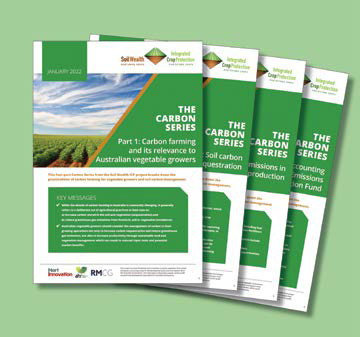
6 The Carbon Series
A hot topic for many in agriculture, the Carbon Series breaks down the practicalities of carbon farming for vegetable growers and the benefits of soil carbon management. The series explored the following topics and provided links to further information and project resources.
• Part 1: Carbon farming and its relevance to Australian vegetable growers
• Part 2: Soil carbon and carbon sequestration
• Part 3: Carbon emissions in vegetable production
• Part 4: Carbon accounting and the Emissions Reduction Fund.
• Podcast: Developing carbon neutral sweet corn in Queensland (Mulgowie Farming Company)
• Webinar recording: Carbon management on vegetable farms — emissions, sequestration and beyond.
7 Ag-tech trial turns up the heat on weeds
Everyone loves a bit of ag-tech and this case study was no different. It investigated the effect of a prototype unit from Growave, which aims to reduce herbicide use within the horticulture industry using microwave technology.
The Australian-first trial of the technology was held at the Soil Wealth ICP Koo Wee Rup demonstration site in Victoria and captured the interest of many growers.
→ Read the article: soilwealth.com.au/resources/case-studies/agtech-trialturns-up-the-heat-on-weeds/
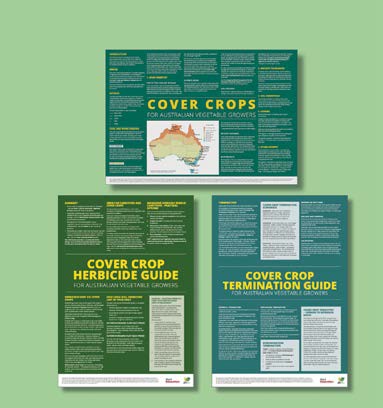
8 Cover crops for Australian vegetable growers poster
With so many cover crop species available, this double-sided A3 poster provides a strong starting point for growers to choose a cover crop to suit their farming operation, climate and cover crop objectives. You can find plenty of information on the benefits, growth tolerances, soil conditions, sowing and establishment traits for a range of cover crop species.
Posters were also developed on cover crop termination and using herbicides with cover crops.
→ Access the posters: soilwealth.com. au/resources/posters/
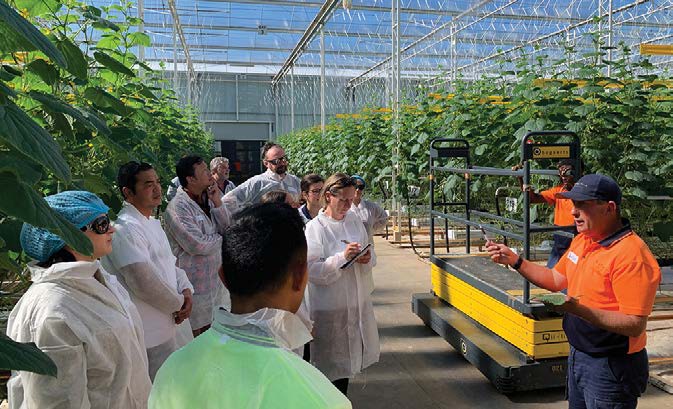
INTEGRATED pest management grower tour at Family Fresh Farms in New South Wales.
9 Integrated weed management: Nutgrass, oxalis and volunteer potatoes
Nutgrass (Cyperus rotundus), also known as purple nutsedge, Java grass, coco-grass and red nutsedge, is a major problem for the Australian vegetable industry — and its popularity as a Soil Wealth ICP resource is testament to this.
The integrated weed management (IWM) fact sheet provides a range of control strategies on nutgrass. Similar fact sheets were also developed for oxalis (Oxalis spp.) and volunteer potatoes (Solanum tuberosum).
→ Read the fact sheets: soilwealth. com.au/resources/fact-sheets/weedmanagement/
10 Maximising IPM practices in protected cropping wrap-up
In 2022, a group of vegetable growers and industry members visited Family Fresh Farms in New South Wales for a Soil Wealth ICP event focusing on how growers can incorporate integrated pest management (IPM) practices in protected cropping.
For those who missed the event, this wrap-up shared the key discussion points on the fundamentals of IPM and ways to improve IPM practices.
MORE INFORMATION
For more information, please contact project leaders Dr Gordon Rogers on (02) 8627 1040 gordon@ahr.com.au and Dr Anne-Maree Boland on (03) 9882 2670 or anne-mareeb@ rmcg.com.au
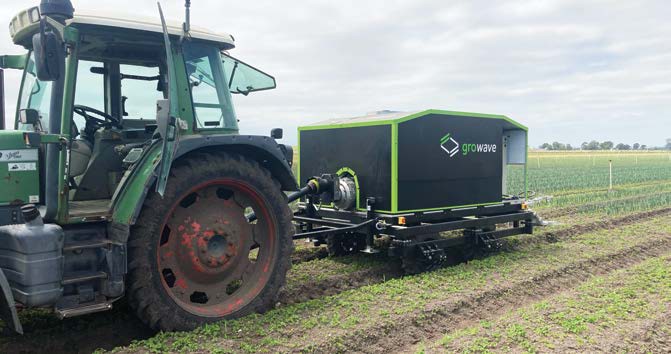
Prototype unit from Growave using microwave technology.

This project has been funded by Hort Innovation using the vegetable research and development levy and funds from the Australian Government. For more information on the fund and strategic levy investment visit horticulture.com.au
Project Number: VG16078